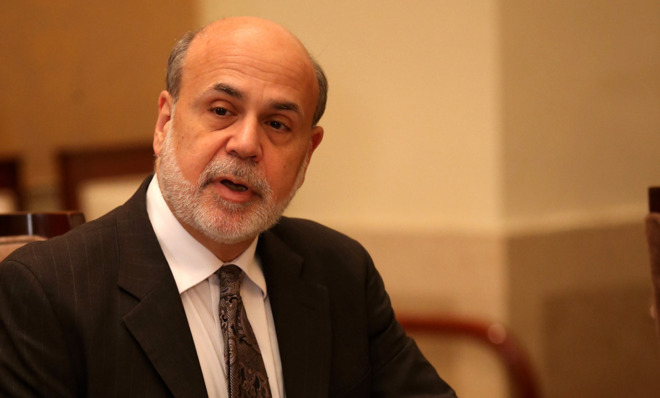The U.S. government is surprisingly cool with Bitcoin
Fed Chairman Ben Bernanke says the virtual currency holds promise

A free daily email with the biggest news stories of the day – and the best features from TheWeek.com
You are now subscribed
Your newsletter sign-up was successful
Bitcoin — the virtual currency mined by solving complex cryptographic problems, and built around a peer-to-peer ledger called a block chain — is often associated with crypto-anarchists on the fringes of society who see such currencies as a means to challenge or attack state power.
But recently, virtual currencies like Bitcoin have been winning praise from unlikely quarters — government officials. In a letter this week answering an inquiry from Congress, outgoing Federal Reserve Chairman Ben Bernanke stated that he thought they may hold "long-term promise":
Historically, virtual currencies have been viewed as a form of “electronic money” or area of payment system technology that has been evolving over the past 20 years. Over time, these types of innovations have received attention from Congress as well as U.S. regulators. For example, in 1995, the U.S. House of Representatives held hearings on “the future of money” at which early versions of virtual currencies and other innovations were discussed. [Fed] Vice Chairman Alan Blinder’s testimony at that time made the key point that while these types of innovations may pose risks related to law enforcement and supervisory matters, there are also areas in which they may hold long-term promise, particularly if the innovations promote a faster, more secure, and more efficient payment system. [via Quartz]
There was more praise from government officials yesterday in a congressional hearing on Bitcoin and other virtual currencies. Mythili Raman of the Justice Department claimed that she thought virtual currencies like Bitcoin had "legitimate uses." Here's the Washington Post summing up her testimony:
The Week
Escape your echo chamber. Get the facts behind the news, plus analysis from multiple perspectives.

Sign up for The Week's Free Newsletters
From our morning news briefing to a weekly Good News Newsletter, get the best of The Week delivered directly to your inbox.
From our morning news briefing to a weekly Good News Newsletter, get the best of The Week delivered directly to your inbox.
"We are attuned to the criminal use," added Mythili Raman of the Justice Department. But "there are many legitimate uses. These virtual currencies are not in and of themselves illegal."
"There is good reason for us to remain watchful" about Bitcoin being used for illicit purposes, Raman added. "But we also intend to balance that against the need for legitimate users" to use the technology. [Washington Post]
Jennifer Calvery of the Treasury's Financial Crimes Enforcement Network emphasized that Bitcoin could be an important innovation like Facebook or Youtube, saying, "Innovation is a very important part of our economy. It's something for us to be proud of."
And Edward Lowery of the Secret Service stated that Bitcoin so far has not been a magnet for criminal networks. Again from the Post:
Later in the same panel, Edward Lowery of the Secret Service testified that cyber criminals "have not by and large gravitated toward peer-to-peer crypto-currencies." Rather, they "have by and large gravitated toward centralized digital currencies that are based in a locale that may have less regulatory guidelines and less aggressive law enforcement." [Washington Post]
Certainly, the praise was balanced with warnings of potential abuses. As an anonymous, borderless currency, Bitcoin can be used for avoiding currency controls, reneging on taxes, and buying and selling contraband like narcotics and weaponry. Those issues alone are likely to create future regulatory issues, as well as legal and political frictions.
But innovation requires giving people the chance to experiment with new technologies. And the U.S. regulatory apparatus appears to be taking a much more innovation-friendly approach than that of the Thai government, for example, which has banned Bitcoin.
A free daily email with the biggest news stories of the day – and the best features from TheWeek.com
It is very encouraging to see the government giving Bitcoin and others a chance to compete against current paperless technologies employed by the likes of Visa, Mastercard, and PayPal. Once the technology is better-established and the wild price swings are less wild, a decentralized, low-friction payments system may hold a lot of promise in the long run — whether that is Bitcoin, or another system incorporating similar technology.
John Aziz is the economics and business correspondent at TheWeek.com. He is also an associate editor at Pieria.co.uk. Previously his work has appeared on Business Insider, Zero Hedge, and Noahpinion.
-
 Political cartoons for February 22
Political cartoons for February 22Cartoons Sunday’s political cartoons include Black history month, bloodsuckers, and more
-
 The mystery of flight MH370
The mystery of flight MH370The Explainer In 2014, the passenger plane vanished without trace. Twelve years on, a new operation is under way to find the wreckage of the doomed airliner
-
 5 royally funny cartoons about the former prince Andrew’s arrest
5 royally funny cartoons about the former prince Andrew’s arrestCartoons Artists take on falling from grace, kingly manners, and more